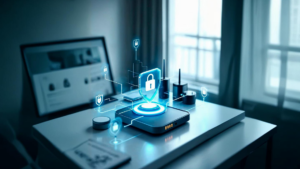
Swapnil Naik
Impact of Cybersecurity in Shaping the Healthcare Ecosystem in 2024
Patient data is vital in the rapidly evolving healthcare landscape, from diagnosing illness and providing medical services and medicine prescriptions to insurance claims. Healthcare organizations face constant threats due to the breadth of fraud opportunities it presents and the increased threat surface due to the pervasive digitization of medical information over cloud platforms and IoT devices.
What is Healthcare Cybersecurity?
Healthcare cybersecurity encompasses safeguarding electronic information and assets to prevent unauthorized access, usage, and disclosure of critical healthcare-sensitive data and protecting patient privacy.
According to recent reports, healthcare data breaches have seen a significant surge of 75%, underscoring the urgency for fortified defenses. Therefore, healthcare cybersecurity measures become paramount to safeguarding sensitive patient information and maintaining the integrity of healthcare systems. In this blog, let’s explore the healthcare cyber threat landscape and delve into how robust cybersecurity measures can serve as a bulwark against potential attacks.
Understanding the Healthcare Cyber Threat Landscape
Healthcare cyber threats are diverse, ranging from ransomware attacks seeking financial gain to espionage targeting valuable medical research. With the healthcare industry becoming a lucrative target, it’s imperative to comprehend the evolving threat landscape and strengthen digital health security measures.
1. Ransomware Menace
Cybercriminals often deploy ransomware to encrypt critical healthcare sensitive data, demanding a ransom for its release. This can disrupt medical services and compromise patient privacy. Ransomware attacks on healthcare institutions have become more sophisticated, often paralyzing operations and demanding hefty ransoms. A chilling example is the 2023 incident where a major hospital’s systems were encrypted, disrupting critical patient care services.
Proactive measures, including regular data backups and advanced threat detection, are essential to thwart these malicious attempts and ensure uninterrupted healthcare cybersecurity services.
2. Data Privacy Concerns
surge in data breaches in healthcare systems by cybercriminals is observed due to unauthorized access to patient data. In 2023, an extensive healthcare network fell victim to a data breach, compromising the personal information of thousands of patients.
Strict adherence to data privacy regulations, such as the Health Insurance Portability and Accountability Act (HIPAA) in the United States, is a legal obligation and a foundational element in building digital health security.
3. IoT Vulnerabilities
The proliferation of Internet of Things (IoT) devices in healthcare introduces new vulnerabilities. In a notable incident, a connected medical device vulnerability allowed unauthorized access to patient data. Each presents a potential entry point for cyber threats, from connected medical devices to wearables.
The healthcare industry must implement stringent digital health security protocols, including regular device updates and network segmentation, to mitigate the risks associated with IoT vulnerabilities and ensure the safety and privacy of patient data.
4. Artificial intelligence
The requirement of vast amounts of patient data to produce accurate results poses high privacy and security risks. The usage of appropriate security controls, like anonymization, authorization, etc, should be designed to maintain the confidentiality and integrity of data.
5. Phishing attacks in Healthcare
Deceptive messages to healthcare employees to compromise PHI information can lead to identity theft and other security threats. For data breach prevention, measures such as the deployment of email security software, spam filters, and employee awareness and training are essential for medical data protection.
6. Insider Threats
Malicious or negligent actions by employees, contractors, or other insiders pose insider threats in healthcare. This can include intentional data theft, accidental data exposure, or failure to follow security protocols.
The Critical Role of Cybersecurity in Building Patient Trust
As the industry embraces innovations like telemedicine and digital health, robust cybersecurity measures, including access controls, encryption, and regular security audits, are essential to fortify the resilience of healthcare systems against potential cyber risks. Here are a few ways to build patient trust with healthcare IT security:
1. Data Encryption, Authentication, and Access Controls
Implementing robust data encryption and access controls ensures that only legitimate users can access sensitive patient information. This safeguards patient privacy and prevents unauthorized alterations to medical records.
2. Continuous Threat Monitoring
Adopting continuous threat monitoring mechanisms allows healthcare organizations to detect and respond to potential cyber threats in real-time. This proactive approach mitigates the impact of security incidents and strengthens overall healthcare IT security.
3. Employee Training and Awareness
Investing in comprehensive cybersecurity awareness training for healthcare cybersecurity staff is crucial. From recognizing phishing attacks in healthcare to understanding the importance of strong passwords, educated employees form a formidable first line of defense against cyber threats.
In conclusion, cybersecurity plays a pivotal role in ensuring the protection of electronic information and assets. With the increasing digitization of patient records, Electronic Health Records (EHR) security, medical data protection, and compliance with regulations such as HIPAA are paramount. Safeguarding against threats like ransomware, phishing attacks, and vulnerabilities in medical devices is critical to maintaining patient privacy and the integrity of healthcare services.
Curious to delve deeper into cybersecurity solutions tailored for the healthcare sector? With advanced end-to-end healthcare cybersecurity offerings from ACL Digital, healthcare organizations can ensure that the trust placed in them by patients and the broader community is well-founded in today’s ever-evolving and complex digital age. Begin your exploration to discover optimal options for patients, healthcare providers, and payers. Get in touch with us today! To learn more, click here.
Related Insights

Simplifying Third-Party Authentication: A Practical Guide

Artificial Intelligence in Healthcare: Saving Lives and Care

AI-Powered Personalization in UX: Enhancing User Experience in Healthcare

Real-time Analytics and Interoperability in Wearable Health Technology: Revolutionizing Patient Care

Enhancing Patient Engagement and Wellness with Wearable Health Technology



